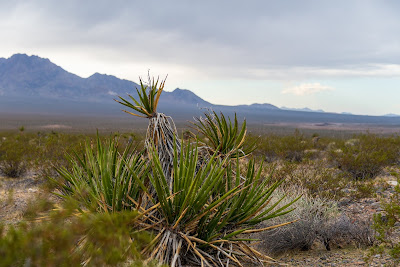Mohave Ground Squirrel Denied Protection
The US Fish and Wildlife Serve announced this week that the rare Mohave Ground Squirrel (MGS) does not qualify to be listed as an endangered species. The MGS is only found in the western Mojave Desert, which has already been fragmented by urban development, military bases, and off-highway vehicle routes. In its ruling, the US Fish and Wildlife Service assumes that the Bureau of Land Management is effectively managing off-highway vehicle (OHV) recreation, and that at least 40% of solar energy applications will not succeed.
According to the US Fish and Wildlife Service:
1.) The Department of Interior already lost a court cause in part due to its inability to properly manage OHV recreation and the creation of hundreds of miles of illegal routes in the MGS' habitat.
2.) The cities of Victorville and Helendale are both seeking to expand their incorporated areas and develop these lands for residential and commercial use, which would affect the MGS' habitat.
3.) Solar companies continue to seek and receive approval for destructive facilities in the MGS' range. Solar Millennium's Ridgecrest Solar power project, if approved, could obstruct a critical MGS connectivity corridor.
A recurrent theme in the listing decision was that most of the MGS' range was under Federal control -- either through the military of Bureau of Land Management.
The MGS is listed as threatened under California law, and the Department of Defense and Bureau of Land Management are cooperating in research efforts to preserve the MGS' habitat. An effort coordinated through the Desert Managers' Group has resulted in some photo-detection surveys to identify areas for future trapping efforts. These studies are intended to build a better understanding of the MGS' range, habitat, and population.
Hopefully the participants of the Desert Managers Group are aware that even with so much of the MGS' range under Federal jurisdiction, a poorly sited energy project or increased OHV activity on Federal lands could fracture the MGS' habitat in irreparable ways.
According to the US Fish and Wildlife Service:
"Based on this information, we conclude that the cumulative impacts of urban and rural development, OHV recreational use, military operations, energy development, transportation infrastructure, grazing, agriculture, mining, and climate change do not currently constitute a significant threat to the Mohave ground squirrel in relation to the present or threatened destruction, modification, or curtailment of its habitat or range, nor do we anticipate that they will pose a threat in the future."This is a very confident statement given that:
1.) The Department of Interior already lost a court cause in part due to its inability to properly manage OHV recreation and the creation of hundreds of miles of illegal routes in the MGS' habitat.
2.) The cities of Victorville and Helendale are both seeking to expand their incorporated areas and develop these lands for residential and commercial use, which would affect the MGS' habitat.
3.) Solar companies continue to seek and receive approval for destructive facilities in the MGS' range. Solar Millennium's Ridgecrest Solar power project, if approved, could obstruct a critical MGS connectivity corridor.
A recurrent theme in the listing decision was that most of the MGS' range was under Federal control -- either through the military of Bureau of Land Management.
The MGS is listed as threatened under California law, and the Department of Defense and Bureau of Land Management are cooperating in research efforts to preserve the MGS' habitat. An effort coordinated through the Desert Managers' Group has resulted in some photo-detection surveys to identify areas for future trapping efforts. These studies are intended to build a better understanding of the MGS' range, habitat, and population.
Hopefully the participants of the Desert Managers Group are aware that even with so much of the MGS' range under Federal jurisdiction, a poorly sited energy project or increased OHV activity on Federal lands could fracture the MGS' habitat in irreparable ways.


Comments
Post a Comment